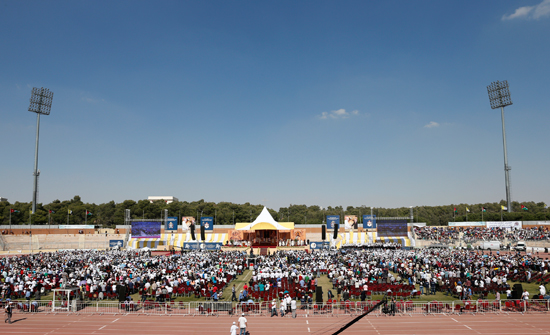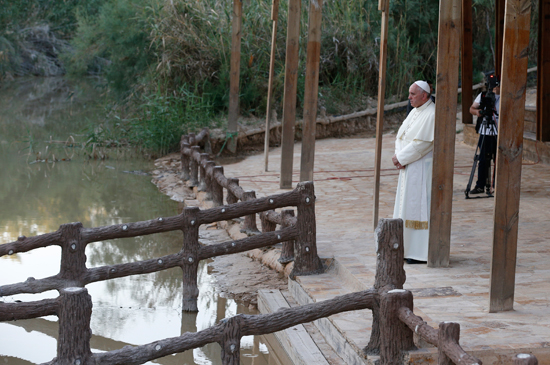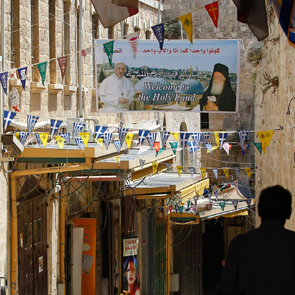Pope Francis called for a “just” solution to the conflict between Israel and the Palestinians and an urgent end to the Syrian crisis on Saturday, in a series of highly political remarks at the start of his three-day visit to the Holy Land.
Speaking in Jordan, the Pope also highlighted the cause of refugees from countries involved in wars around the Middle East, including Iraq, and thanked Jordan for hosting many of them.
After his plane touched down at Amman's Queen Alia International Airport, Francis immediately headed for the royal palace to meet King Abdullah and Queen Rania of Jordan, and addressed the royal family and authorities there.
“I thank the authorities of the kingdom for all they are doing and I encourage them to persevere in their efforts to seek lasting peace for the entire region,” he said. “This goal urgently requires that a peaceful solution be found to the crisis in Syria, as well as a just solution to the Israeli-Palestinian conflict."
Later, in a homily during Mass at the International Stadium in Amman in front of 50,000 people, Pope Francis made his first reference of the trip to “Palestine” ahead of his visit to Bethlehem on Sunday, as he expressed solidarity with the shrinking Christian population in the region. “I … embrace with affection the many Christian refugees from Palestine, Syria and Iraq: please bring my greeting to your families and communities, and assure them of my closeness,” he said.

In his earlier address, Francis also thanked the Arab state, which has recently opened a third major refugee camp, for welcoming so many refugees from the region.
“Jordan has offered a generous welcome to great numbers of Palestinian and Iraqi refugees, as well as to other refugees from troubled areas, particularly neighbouring Syria, ravaged by a conflict which has lasted all too long,” he said.
Francis also expressed his “profound respect and esteem for the Muslim community” and said that Jordan – which signed a peace accord with Israel in 1994 – had created a "climate of serene coexistence" between Christians and Muslims in the desert kingdom.
"Religious freedom is in fact a fundamental human right and I cannot fail to express my hope that it will be upheld throughout the Middle East and the entire world," he added.
King Abdullah, in his remarks, referred to “the Islam of peace” and praised the Pope’s “humanity and wisdom”.
On the Israeli-Palestinian conflict, King Abdullah added: "The status-quo of 'justice denied' to the Palestinians; fear of the other; fear of change; these are the way to mutual ruin, not mutual respect."

On Saturday night Pope Francis visited the traditional site of Jesus’s baptism at Bethany beyond the Jordan.
Above: Pope Francis celebrates Mass at Amman International Stadium in Amman, Jordan. Photo: CNS photo/Paul Haring
Avobe: Pope Francis visits Bethany Beyond the Jordan, the traditional site of Jesus' baptism, southwest of Amman, Jordan, 24 May Photo: CNS photo/Paul Haring
For a pre-view of Pope Francis’s Holy Land visit see here.
Full texts of his addresses at the Royal Palace and his homily at the International Stadium below:
Your Majesties,
Your Excellencies,
Dear Brother Bishops,
Dear Friends,
I thank God for granting me this opportunity to visit the Hashemite Kingdom of Jordan in the footsteps of my predecessors Paul VI, John Paul II and Benedict XVI. I am grateful to His Majesty King Abdullah II for his warm words of welcome, as I recall with pleasure our recent meeting in the Vatican. I also greet the members of the Royal Family, the government and the people of Jordan, this land so rich in history and with such great religious significance for Judaism, Christianity and Islam.
Jordan has offered a generous welcome to great numbers of Palestinian and Iraqi refugees, as well as to other refugees from troubled areas, particularly neighboring Syria, ravaged by a conflict which has lasted all too long. Such generosity merits the appreciation and support of the international community. The Catholic Church, to the extent of its abilities, has sought to provide assistance to refugees and those in need, especially through Caritas Jordan.
While acknowledging with deep regret the continuing grave tensions in the Middle East, I thank the authorities of the Kingdom for all that they are doing and I encourage them to persevere in their efforts to seek lasting peace for the entire region. This great goal urgently requires that a peaceful solution be found to the crisis in Syria, as well as a just solution to the Israeli-Palestinian conflict.
I take this opportunity to reiterate my profound respect and esteem for the Muslim community and my appreciation for the leadership of His Majesty the King in promoting a better understanding of the virtues taught by Islam and a climate of serene coexistence between the faithful of the different religions. I am grateful that Jordan has supported a number of important initiatives aimed at advancing interreligious dialogue and understanding between Jews, Christians and Muslims. I think in particular of the Amman Message and the support given within the United Nations Organization to the annual celebration of World Interfaith Harmony Week.
I would also like to offer an affectionate greeting to the Christian communities present in this country since apostolic times, contributing to the common good of the society of which they are fully a part. Although Christians today are numerically a minority, theirs is a significant and valued presence in the fields of education and health care, thanks to their schools and hospitals. They are able to profess their faith peaceably, in a climate of respect for religious freedom. Religious freedom is in fact a fundamental human right and I cannot fail to express my hope that it will be upheld throughout the Middle East and the entire world. The right to religious freedom “includes on the individual and collective levels the freedom to follow one’s conscience in religious matters and, at the same time, freedom of worship… [it also includes] the freedom to choose the religion which one judges to be true and to manifest one’s beliefs in public” (Ecclesia in Medio Oriente, 26). Christians consider themselves, and indeed are, full citizens, and as such they seek, together with their Muslim fellow citizens, to make their own particular contribution to the society in which they live.
Finally, I cordially invoke peace and prosperity upon the Kingdom of Jordan and its people. I pray that my visit will help to advance and strengthen good and cordial relations between Christians and Muslims.
I thank you for your courteous welcome. May the Almighty and Merciful God grant happiness and long life to Your Majesties, and may he bless Jordan abundantly. Salaam!
Homily at Amman’s International Stadium
In today’s Gospel, we hear Jesus promise the disciples: “I will pray the Father, and he will give you another Paraclete, to be with you forever” (Jn 14:16). The first Paraclete is Jesus himself; the other is the Holy Spirit.
We are not far from where the Holy Spirit descended with power on Jesus of Nazareth after his baptism by John in the River Jordan (cf. Mt 3:16). Today’s Gospel, and this place to which, by God’s grace, I have come as a pilgrim, invite us to meditate on the Holy Spirit and on all that he has brought about in Christ and in us. In a word, we can say that the Holy Spirit carries out three actions – he prepares, he anoints and he sends.
At the baptism, the Holy Spirit descended upon Jesus to prepare him for his mission of salvation, the mission of one who is a Servant, humble and meek, ready to share and give himself completely. Yet the Holy Spirit, present from the beginning of salvation history, had already been at work in Jesus from the moment of his conception in the virginal womb of Mary of Nazareth, by bringing about the wondrous event of the Incarnation: “the Holy Spirit will come upon you, will overshadow you – the Angel said to Mary – and you will give birth to a son who will be named Jesus” (cf. Lk 1:35). The Holy Spirit had then acted in Simeon and Anna on the day of the presentation of Jesus in the Temple (cf. Lk 2:22). Both were awaiting the Messiah, and both were inspired by the Holy Spirit. Simeon and Anna, upon seeing the child, knew immediately that he was the one long awaited by the people. They gave prophetic expression to the joy of encountering the Redeemer and, in a certain sense, served as a preparation for the encounter between the Messiah and the people.
These various works of the Holy Spirit are part of a harmonious action, a sole divine plan of love. The mission of the Holy Spirit, in fact, is to beget harmony – he is himself harmony – and to create peace in different situations and between different people. Diversity of ideas and persons should not trigger rejection or prove an obstacle, for variety always enriches. So today, with fervent hearts, we invoke the Holy Spirit and ask him to prepare the path to peace and unity.
The Holy Spirit also anoints. He anointed Jesus inwardly and he anoints his disciples, so that they can have the mind of Christ and thus be disposed to live lives of peace and communion. Through the anointing of the Spirit, our human nature is sealed with the holiness of Jesus Christ and we are enabled to love our brothers and sisters with the same love which God has for us. We ought, therefore, to show concrete signs of humility, fraternity, forgiveness and reconciliation. These signs are the prerequisite of a true, stable and lasting peace. Let us ask the Father to anoint us so that we may fully become his children, ever more conformed to Christ, and may learn to see one another as brothers and sisters. Thus, by putting aside our grievances and divisions, we can show fraternal love for one another. This is what Jesus asks of us in the Gospel: “If you love me, you will keep my commandments. And I will pray the Father, and he will give you another Paraclete, to be with you for ever” (Jn 14:15-16).
Lastly, the Holy Spirit sends. Jesus is the one who is sent forth, filled with the Spirit of the Father. Anointed by the same Spirit, we also are sent as messengers and witnesses of peace.
Peace is not something which can be bought; it is a gift to be sought patiently and to be “crafted” through the actions, great and small, of our everyday lives. The way of peace is strengthened if we realize that we are all of the same stock and members of the one human family; if we never forget that we have the same heavenly Father and are all his children, made in his image and likeness.
It is in this spirit that I embrace all of you: the Patriarch, my brother bishops and priests, the consecrated men and women, the lay faithful, and the many children who today make their First Holy Communion, together with their families. I also embrace with affection the many Christian refugees from Palestine, Syria and Iraq: please bring my greeting to your families and communities, and assure them of my closeness.
Dear friends! The Holy Spirit descended upon Jesus in the Jordan and thus inaugurated his work of redemption to free the world from sin and death. Let us ask the Spirit to prepare our hearts to encounter our brothers and sisters, so that we may overcome our differences rooted in political thinking, language, culture and religion. Let us ask him to anoint our whole being with the oil of his mercy, which heals the injuries caused by mistakes, misunderstandings and disputes. And let us ask him to send us forth, in humility and meekness, along the demanding but enriching path of seeking peace.




 Loading ...
Loading ...